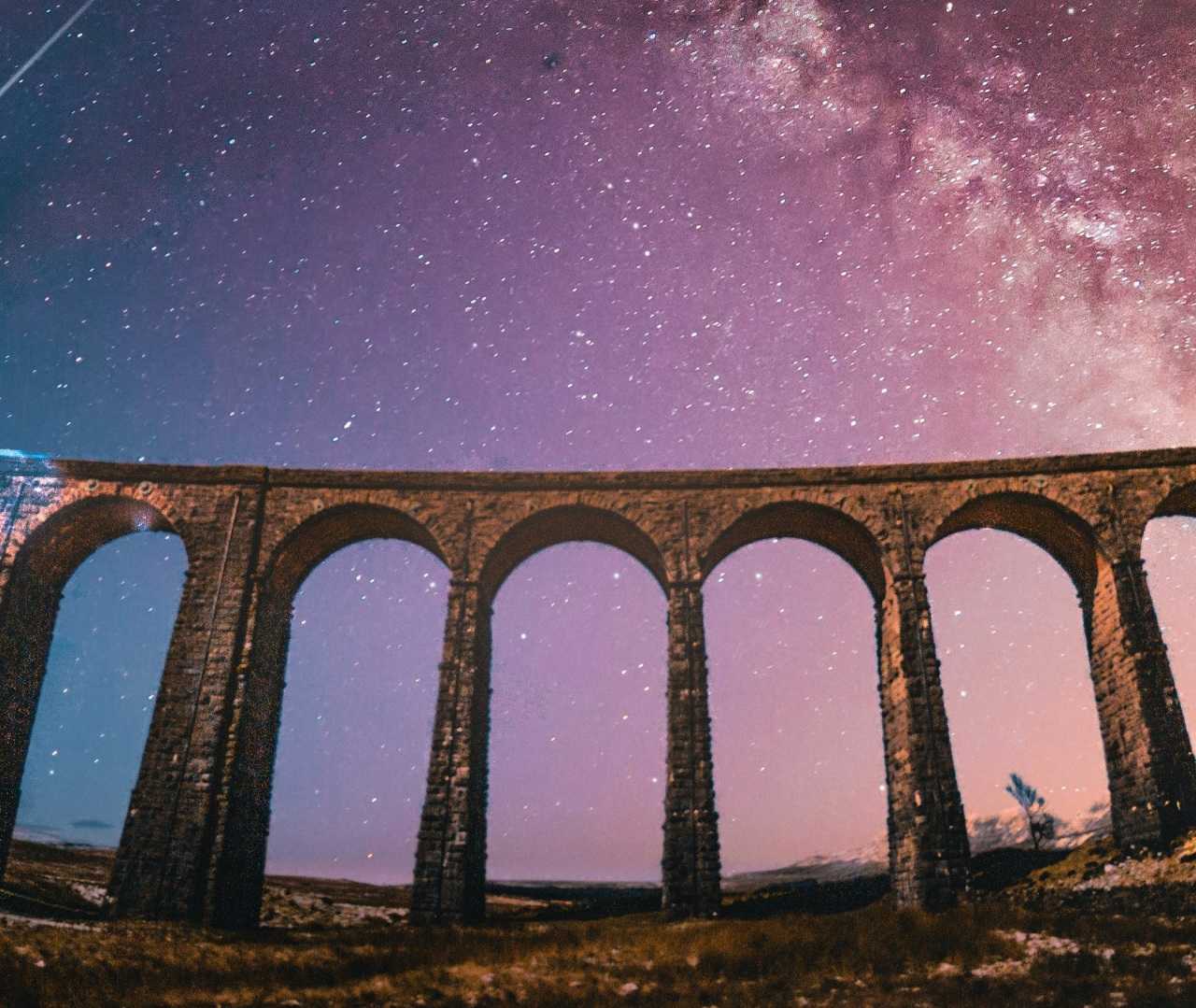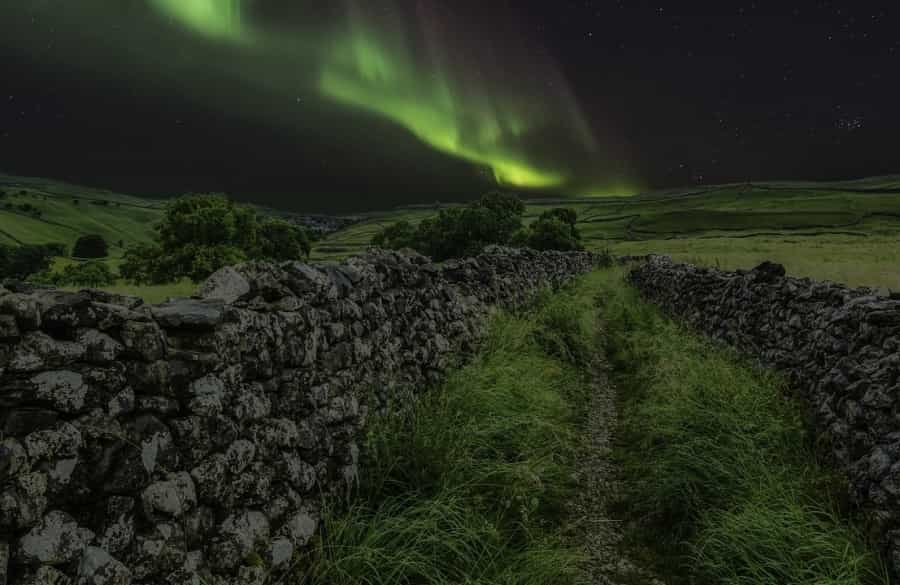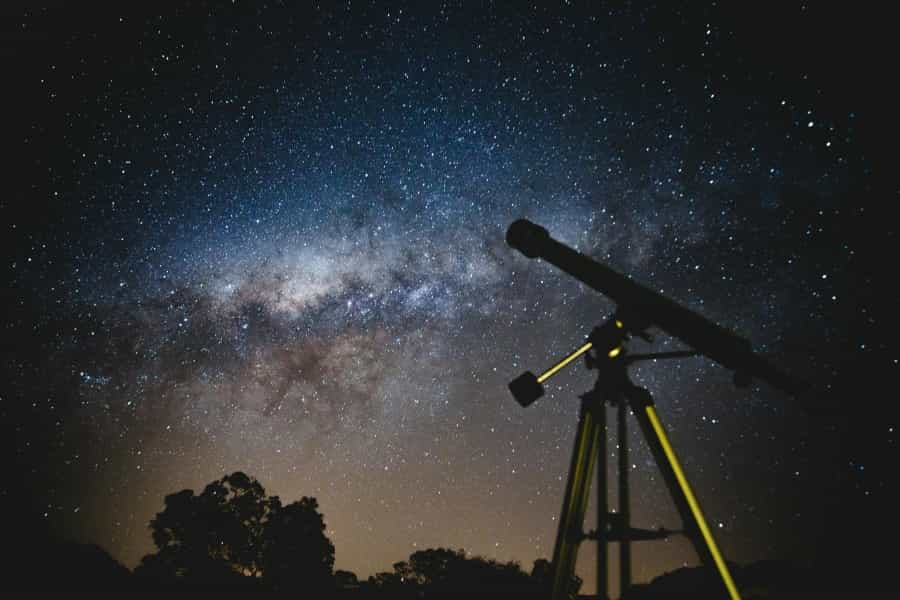Stargazing in the Yorkshire Dales National Park

Yorkshire is proud to be home of two of the UK's seven International Dark Sky Reserves – areas with spectacular dark skies for studying and photographing the stars. Like its neighbour, the North York Moors, the Yorkshire Dales National Park is a haven for star spotters. The landscape here offers expansive dales, peaks and uplands moors under unpolluted night skies, where you can spot the planets of our solar system, the glimmering Milky Way and thousands of constellations – even the Northern Lights put in occasional appearances too.
Designated in 2020, the Yorkshire Dales is the largest dark sky reserve in the UK, covering almost all the national park. As most stargazing events take place in the darker winter months, a new breed of visitor is now discovering the park and helping to boost tourism all year round.
Pitchup has done all the legwork in bringing together this expert guide to stargazing in the Yorkshire Dales, listing official Dark Skies Discovery Sites, secrets about the best 'off-grid' viewing sites and tips for successful after-dark adventures for all ages.
Best place to stargaze in the Yorkshire Dales
There are four official Dark Skies Discovery Sites within the Yorkshire Dales National Park, all tucked well away from ambient light sources.
Buckden Car Park
Open until midnight Buckden Car Park stays open until midnight (parking charges apply) and has fabulous views of open skies down Wharfedale, plus very little in the way of light disturbance.
Hawes National Park Visitor Centre
Adjoining the Dales Countryside Museum, the large car park at the visitor centre is a designated dark skies site. While the facilities (a shop, café and accessible loos) will only be open during official dark skies events, you can warm up in the pubs and pizzerias of lively Hawes after a session gazing up at the Milky Way.
Malham National Park Visitor Centre
With a set-up similar to Hawes, the car park at Malham is a popular hotspot for night-sky observers. Get there early to stroll down to spectacular Malham Tarn, then make the most of the village’s minimal light pollution to gaze up at the cosmos after dark. You’ll need to pay to park up until midnight, and the accessible loos are open until then too.
Good to know: A brace of local pubs in Malham serve warming food to get you through a chilly evening.
Tan Hill Inn
Already awarded the accolade of ‘highest pub in the country’, Tan Hill Inn is also probably the best spot in the Yorkshire Dales for stargazing, thanks to wide-open views across moorland in all directions. On clear nights, you’ll see all the major constellations, including Orion and The Plough, and the Milky Way is often visible to the naked eye. There is plenty of flat terrain to set up your equipment, rooms are available at the pub, and free overnight parking is across the road.
Good to know: You can pop into the pub for a warming whisky by the roaring fire after some time in the chilly night air. Always check the weather forecast though, as people have often been snowed in overnight at this remote moor-top spot.
A superb ‘unofficial’ stargazing spot

Ribblehead Viaduct
Arrive before sunset to admire the landmark viaduct across the remote Ribble Valley; there's parking by the road and it’s just a couple of minutes’ stroll to the arches for night-time views of the Milky Way and a myriad of stars. There’s virtually no light pollution here, and astrophotographers can have a field day snapping away at the glittering heavens.
Good to know: The viaduct makes a fantastic backdrop for photos of the night sky – especially if the elusive Lady Aurora (the Northern Lights) puts in an appearance.
Observatories in the Yorkshire Dales
On the eastern fringes of the national park in the equally gorgeous Nidderdale National Landscape, Lime Tree Observatory is on a remote farm outside the pretty village of Grewelthorpe. Pride of place goes to the 24-inch telescope, and ace astronomer Martin Whipp runs regular late-night events in the 3D planetarium.
There’s also a permanent telescope pointed to the skies at privately run Yorkshire Dales Observatory near Sedbergh.
Stargazing festivals
Two dark skies festivals are held every year in the Yorkshire Dales National Park. They get booked up very quickly (as does the accommodation) so always book your tickets for stargazing events well in advance.
Dark Skies Festival: 14 February-2 March 2025
The year 2025 sees the 10th anniversary of the Yorkshire Dales Dark Skies Festival, so it will be a bonanza of events including stargazing talks led by professional astronomers at all the best dark-skies locations in the park, as well as lessons in astrophotography. Kids who are interested in astronomy can join family-friendly activities including rocket making and nocturnal wildlife walks – while adults are busy night-time fell running and canoeing in the dark.
Good to know: There are more stargazing events kicking off at the same time in the neighbouring North York Moors National Park, which hosts its own Dark Skies Festival on the same dates.
Dark Skies Fringe Festival: 25 October-3 November
If you can't wait for the February celebration of all things astral, visit instead for the Dark Skies Fringe Festival, held over autumn half term. As well as star-spotting sessions and hands-on workshops at the Dales Countryside Museum, some of the night-time events are accompanied by pizzas and hot drinks to make sure kids stay happy and warm.
Tips for successful stargazing
One of the many joys of stargazing is that you don’t need any specialist gear, but the following suggestions help to make the most of your experience.
Pitchup’s six top tips for successful stargazing
-
Moonless nights and the dark nights of autumn or winter are top stargazing times; the moon detracts from the experience if it’s too bright.
-
Your eyes will take about half an hour to get accustomed to looking at the night sky.
-
Use a red bike light or a red-light torch to reduce light pollution around you.
-
If you use your phone for vision, change the display to a night-time setting.
-
Use smartphone apps like Star Guide to search for constellations and planets in the night sky.
-
You’ll see plenty with the naked eye, but a pair of binoculars will definitely improve your view.
Four things to take stargazing

-
Night-time temperatures in the Yorkshire Dales National Park get chilly after dark, so bring layers of clothing, hats and gloves to keep warm.
-
Take blankets to sit on or wrap around you for further warmth.
-
Fill flasks with hot drinks to keep you warm and revive any flagging spirits.
-
A tripod is useful for steadying your telescope or camera; for ease, set your equipment up before sunset.
Six tips for stargazing etiquette
-
Avoid loud behaviour. Too much noise will disturb other would-be astronomers – and the wildlife.
-
Don’t set up too close to other stargazers.
-
If you’ve got young kids with you, keep them interested in what’s going on and don’t let them wander off.
-
Don’t litter; take everything home with you.
-
Leave dogs in the car/at home.
- Plan a safe route back to your car/transport/accommodation and take a torch.
Need more inspo? The national park authorities have produced a useful leaflet with some ‘stellar’ information for prospective astronomers.
With four Dark Sky Discovery Sites (and one very special place for stargazing at Ribblehead), expert astronomers on hand at the observatory and magical annual stargazing festivals, the Yorkshire Dales is a marvellous destination for getting to grips with celestial displays. If you’re keen to make the most of your time after dark, opt for camping under the stars; novice astronomers can read up all about stargazing while camping with Pitchup’s guide to dark skies camping.